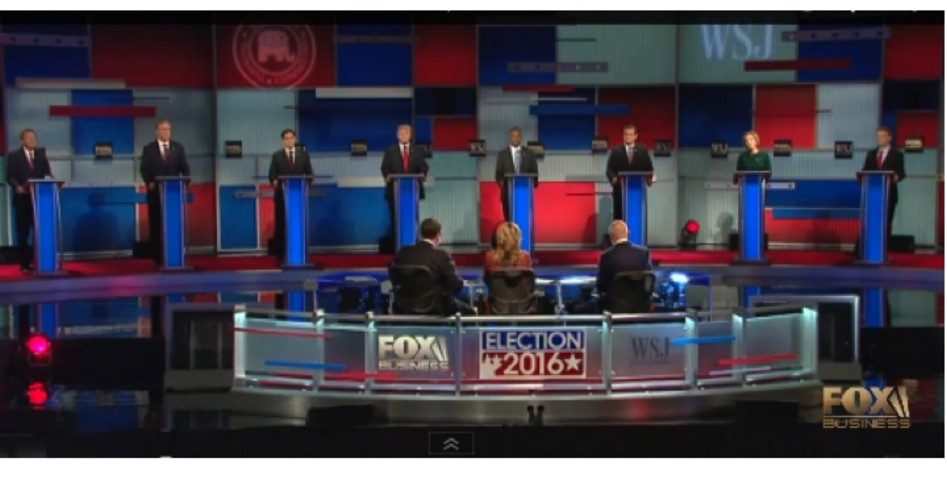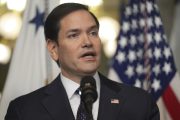
A more orderly and respectful atmosphere surrounded the fourth Republican debate on Tuesday night, a sharp contrast to last month’s debate where the moderators became the issue. That didn’t mean there were no fireworks, or disagreements, just that the tone was more serious, as the candidates tried to shore up their positions and their poll numbers as they approached the final debate in December.
The topics included questions on immigration, tax policy, the economy, regulation of business and Wall Street, the minimum wage, and the presumptive Democrat candidate, Hillary Clinton. Missing from the conversation, unfortunately, were concerns about America’s declining freedoms, the infringements of her national sovereignty threatened by the Trans-Pacific Partnership (TPP), the role of the Federal Reserve in manipulating the currency in its failing attempts to stimulate the economy, the increasing attacks on the Second Amendment, and overreach by the Supreme Court in a number of its recent decisions. Mention of the Constitution of the United States was notably missing during the three-hour debate.
In other words, Tuesday night’s debate was entertaining, occasionally feisty, briefly hilarious, but substantively weak. It was a major in minors, almost a distraction from the real issues facing the country.
Early on Ben Carson delighted the partisan crowd when he was asked about the media’s double standards when vetting him compared to the kid-glove treatment of Barack Obama during his initial run for the presidency in 2008. Neil Cavuto, one of the three moderators, posed this to Carson:
You recently railed against the double-standard in the media, sir, that seems obsessed with inconsistencies and potential exaggerations in your life story, but looked the other way when it came to then-Senator Barack Obama’s. Still, as a candidate whose brand has always been trust, are you worried your campaign — which you’ve always said, sir, is bigger than you — is now being hurt by you?
Carson: Well, first of all, thank you for not asking me what I said in the 10th grade. I appreciate that.
(Laughter, followed by applause)
Cavuto: I’ll just forget that follow-up there.
(Laughter)
Carson: The fact of the matter is, you know what? We should vet all candidates. I have no problem with being vetted. What I do have a problem with is being lied about and then putting that out there as truth.
(Applause)
And I don’t mind that so much, if they do it about — with everybody, like people on the other side. But, you know, when I look at somebody like Hillary Clinton, who sits there and tells her daughter and a government official that, No, this was a terrorist attack, and then tells everybody else that it was a video … where I come from, they call that a lie.
(Cheering and applause)
Questions from the moderators (Cavuto, Maria Bartiromo, and editor-in-chief of the Wall Street Journal, Gerard Baker) focused on immigration, which immediately revealed perhaps the biggest chasm of disagreement between the candidates. When Donald Trump reiterated his position that illegals needed to be rounded up and sent home, Ohio Governor John Kasich declared, “Come on, folks. We all know you can’t pick [11 million illegal immigrants] up and ship them back across the border. It’s a silly argument. It makes no sense.”
And then, sounding very much like the amnesty plan developed by the Senate’s Gang of Eight, Kasich expounded:
It’s just not possible and it’s not embracing American values. What we need to do is allow people to earn legal status where they pay a fine, where they work, where they don’t commit crimes, where they learn English. And over a period of time, they earn legal status. That’s the proper path to make this work.
On increased military spending, Senators Rand Paul and Marco Rubio, caused sparks to fly. Paul asked Rubio rhetorically:
How is it conservative to add a trillion dollar expenditure for the federal government that you’re not going to pay for? You cannot be a conservative if you’re going to keep promoting new programs that you’re not going to pay for.
Rubio replied sharply:
We can’t even have an economy if we’re not safe. There are radical jihadists in the Middle East beheading people and crucifying Christians. A radical Shia cleric in Iran [is] trying to get a nuclear weapon. The Chinese [are] taking over the South China Sea.
Yes, I know the world is a safer and better place when America is the strongest military power in the world.
The pro-military interventionist crowd gave thunderous approval, but Paul set his face like flint: “I do not think we are any safer from bankruptcy court! As we go further and further into debt, we become less and less safe.”
The issue of the minimum wage got a variety of responses, some of them erudite and well-informed, like this one from Carson: “Every time we raise the minimum wage, the number of jobless people increases. This is particularly a problem in the black community.”
On cutting spending with the goal of balancing the budget, Kasich suggested nibbling around the edges of the out-of-control Medicare program: “We would move the Medicare system from a seven percent growth [rate] down to a five percent growth [rate].”
On government regulations, Jeb Bush called for massive repeals of particularly onerous and egregious rules and regulations:
I think we need to repeal every rule that Barack Obama has [passed]: the regulation of the Internet, the Clean Power Act, the Waters of the United States Act.… We should repeal the rules because the economic costs far outweigh the social benefit.
On the troubles in the Middle East, Carson and Bush supported interventionist policies, with Carson advocating sending U.S. troops to capture the big oil field west of Baghdad in the Anbar Province. Said Carson: “Take that from them — we can do that fairly easily — and then you move on from there. But you have to continue to face them, because our goal is not to contain them but to destroy them before they destroy us.”
Slightly less aggressive was Bush, who suggested a no-fly-zone in Syria, and safe zones for refugees fleeing the devastation there.
The Trans-Pacific Partnership (TPP) was touched on only briefly, and that by supporter Kasich: “The TPP is critical to us, not only for economic reasons and for jobs, but it allows us not only to create economic alliances and also potentially strategic alliances against the Chinese. They’re not our enemy, but they’re not our friend.”
On bailing out big banks when they get in trouble, Cruz opposed the strategy but supported the Federal Reserve mechanism that allows them to get in trouble in the first place:
I would not bail them out but … [would keep] our money tied to a stable level of gold and [let the Federal Reserve remain in place] as the lender of last resort. That’s what central banks do. It’s not a bail out. It’s a loan at higher interest rates.
Trump seemed to lose traction with glittering generalities on his policies and his piggish behavior on stage. At one point the audience booed him when he criticized Carly Fiorina for trying to interrupt Paul during his foreign policy response, shouting: “Why does she keep interrupting everybody?”
There were several moments of hilarity but none better than that enjoyed by the audience when Maria Bartiromo asked this question of Marco Rubio:
Senator Rubio, Hillary Clinton is the clear front runner for the Democratic nomination. If she is indeed the nominee, you will be facing a candidate with an impressive resume.
(raucous laughter from the audience)
She was the first lady of the United States, a U.S. senator from New York, and secretary of state under Barack Obama. She has arguably more experience, certainly more time in government than almost all of you on stage tonight.
Why should the American people trust you to lead this country, even though she has been so much closer to the office?
(more laughter)
Rubio smiled, missing the opportunity to suggest that her experience is more of a liability than an asset, but instead rolled out part of his stump speech to respond to it.
It was a moment of hilarity at Hillary’s expense.
Drudge polls taken immediately after the debate, and revisited several hours later, revealed small but perhaps significant changes from polls taken following last month’s debate. Last month Trump scored 55 percent but dropped to 36 percent after Tuesday’s debate. Senator Ted Cruz scored 23 percent, just slightly ahead of last month’s poll at 21 percent, while Senator Rand Paul jumped from single digits last month to 15 percent. Senator Marco Rubio lost a little ground, scoring 10 percent on Tuesday compared to 13 percent a month ago.
Dead last in the poll was Jeb Bush, receiving just 2,865 votes out of the 267,000 cast following the debate. Laura Ingraham, watching the poll numbers roll out following the debate, tweeted: “DONE! That white plastic thing has popped out on Jeb’s chicken.”
The survivors of Tuesday night’s debate now have a break before presenting their political wares to a partisan audience in December in Las Vegas, an appropriate locale well-known for its legalized gambling and games of chance.
A graduate of an Ivy League school and a former investment advisor, Bob is a regular contributor to The New American magazine and blogs frequently at www.LightFromTheRight.com, primarily on economics and politics. He can be reached at [email protected].
Related articles:
Republican Debate: Rubio, Cruz, Trump Rocked; CNBC Got Mocked
Is Ben Carson’s Campaign “Over”?


